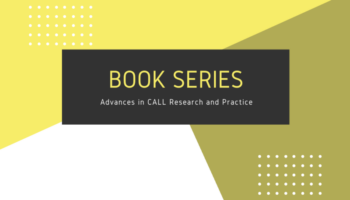
CALICO is now soliciting proposals for the next volume in the Advances in CALL Research and Practice book series to be published in Spring 2026. The volume may be a single-authored monograph or edited volume and may treat any topic related to the field of CALL.
Proposals should include the following information:
- name of the author(s)/editor(s) with short bio of about 100 words;
- tentative title;
- description of how the book will contribute to the discipline;
- outline of the scope and sequence of the book, including the number of chapters, their titles, and a brief synopsis of each;
- production timeline (containing such dates as deadlines for CfPs, authors, reviewers, revisions); and
- if an edited volume, description of the procedures for soliciting and refereeing manuscripts for the chapters.
Proposals should be submitted as a Word document to steph.link@okstate.edu no later than September 15, 2023. Final chapters must be submitted to Equinox no later than August 30, 2025.
You can find more information about the series here: https://www.equinoxpub.com/home/advances-call-research-practice/
The 2026 volume will be the tenth book in the new series. Previous volumes include:
2016 Landmarks in CALL Research, Edited by Greg Kessler
2017 Learner Autonomy and Web 2.0, Edited by Tim Lewis, Annick Rivens Mompean, and Marco Cappellini
2018 Assessment Across Online Language Education, Edited by Stephanie Link and Jinrong Li
2019 Engaging Language Learners through CALL, Edited by Nike Arnold and Lara Ducate
2020 Understanding Attitude in intercultural virtual communication, Edited by Ana Oskoz and Marga Vinagre
2021 Project-Based Language Learning and CALL: From Virtual Exchange to Social Justice, Edited by Michael Thomas and Kasumi Yamazaki
2022 Identity, Multilingualism and CALL, Edited by Liudmila Klimanova
2024 Crisis Response to Language Teaching Edited by Senta Goerter and Jesse Gleason
2025 Advancing Critical CALL Across Institutions and Borders Edited by Emma Britton, Angelika Kraemer, Theresa Austin, Hengyi Liu, and Xinyue Zuo
Recent volumes in the previous CALICO Monograph series include:
2010 CALL in Limited Technology Contexts, ed. Joy Egbert
2011 Present and Future Promises of CALL (2nd edition of 2006), eds. Nike Arnold and Lara Ducate
2012 Technology Across Writing Contexts and Tasks, eds. Greg Kessler, Ana Oskoz, and Idoia Elola
2013 Design-Based Research in CALL, eds. Julio Rodríguez and Cristina Pardo-Ballester
2014 Digital Literacies in Foreign and Second Language Education, eds. Janel Pettes Guikema and Lawrence Williams
2015 Researching Language Learner Interaction Online: From Social Media to MOOCs, eds. Ed Dixon and Michael Thomas

